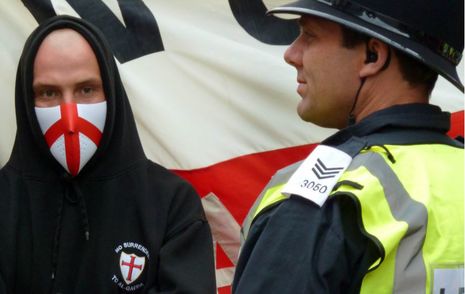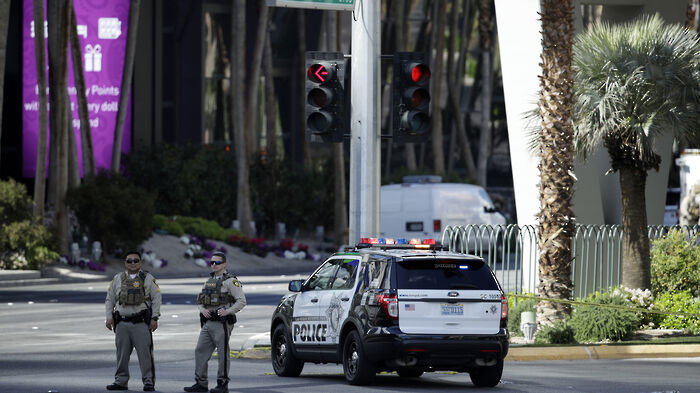Political violence isn’t a ‘both sides’ issue
Jed Asemota believes that treating the threat of violence on both sides of the political spectrum as equal is helping to legtimate far-right violence.

The violence in the US Capitol is a pressing reminder of the constant threat right-wing extremists pose to society. Within less than a week, the lessons we were supposed to learn from this are already being watered down by claims from establishment figures that the left in the UK and US are capable of the same kind of violence. Yet not only is this a false equivalence that distracts from and excuses the violence in the Capitol, it is also hysteria that - judging by recent political history - doesn’t stand up to scrutiny.
It is not controversial to say that the right are more violent than the left. This is evident from statistics showing that two thirds of terrorist incidents in the USA last year involved right-wing terrorists, compared to only one killing linked to anti-fascism in 25 years. The desire to make every issue a ‘both sides’ BBC-style debate is feeding the growth of violent tendencies on the right.
The words of journalist Ayesha Hazarika that ‘no wing of politics is immune from stirring the mob’ are ostensibly true, but ignore the issue at hand: that the far-right poses a uniquely dangerous threat to society, and in particular the marginalised groups they target. Similarly, Ian Austin’s claims that the ‘hard left’ in the UK would react violently to losing an election clearly ignore the peaceful concession of two electoral defeats in the last few years. Both figures cite hostile treatment online from figures on the left, but fail to point to any instances of violence to support this equation with the far-right.
This criticism of the ‘far left’ is supposedly based on the potential for future violence that overlooks the very real right-wing terrorism in the UK that claimed the life of Labour MP Jo Cox, only as recently as 2016. This has been glossed over to the point that it barely registers in the public consciousness anymore - a British MP was murdered in broad daylight by an armed man shouting, ‘Britain first’. Drawing a false equivalence between the real violence on the right and a mythical violence on the left helps to absolve politicians on the right from the consequences of their divisive rhetoric.
“Right-wing extremism does not threaten the status quo. It seeks to maintain the anti-minority consensus that currently stands firm in our politics”
The more one tries to confect an equally violent threat on the left, the more violence on the right is justified in their minds and perpetrated on our streets. The perfect example of such is Kyle Rittenhouse, the teenager who shot three protesters at a Kenosha Black Lives Matter rally, killing two and claiming that they were Antifa (Anti-fascists). One can also point to the Proud Boys who Trump refused to denounce in the first presidential debate, or the Boogaloo boys, who were responsible for a string of attacks last year. The way in which both Joe Biden and Donald Trump along with their respective party establishments played up the threat of Antifa helped to create the environment for right-wing extremists to feel emboldened to counter this supposed danger to the country.
In the UK, last summer saw Black Lives Matter protesters confronted by EDL members, who were unhelpfully referred to in the media as ‘counter-protesters’. This is not only lazy but reflects the actual reason for the persistent search for an equally dangerous left-wing threat, real or imagined. This reason is that right-wing extremism does not threaten the status quo. It seeks to maintain the anti-minority consensus that currently stands firm in our politics - systematic oppression achieved by years of rightward shifts on immigration and social policy.
One has to wonder how far removed the violence on Capitol Hill was from the gerrymandering and voter suppression operations the US Republican party has administered in the post-Civil Rights era to effectively disenfranchise black voters. As Donald Trump said so eloquently, without voter suppression, ‘you’d never have a Republican elected in this country again’. And in the UK, how can we divorce the Conservative Party’s anti-Muslim, anti-immigrant rhetoric from spikes in violence against both groups?
If we cannot separate the Republican Party’s anti-democratic actions from its supporters’ lack of respect for democratic procedure, then violence against marginalised groups must be traced back to the harshening of political rhetoric towards them.
We must acknowledge the role right-wing parties have in creating a welcoming environment for political violence. Words matter - and right-wing parties, in particular, have all too frequently used them to open the door to violence.
 News / Judge Business School advisor resigns over Epstein and Andrew links18 February 2026
News / Judge Business School advisor resigns over Epstein and Andrew links18 February 2026 News / Gov grants £36m to Cambridge supercomputer17 February 2026
News / Gov grants £36m to Cambridge supercomputer17 February 2026 News / Hundreds of Cambridge academics demand vote on fate of vet course20 February 2026
News / Hundreds of Cambridge academics demand vote on fate of vet course20 February 2026 News / CUCA members attend Reform rally in London20 February 2026
News / CUCA members attend Reform rally in London20 February 2026 News / Union speakers condemn ‘hateful’ Katie Hopkins speech14 February 2026
News / Union speakers condemn ‘hateful’ Katie Hopkins speech14 February 2026










